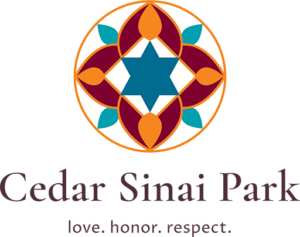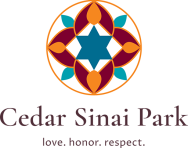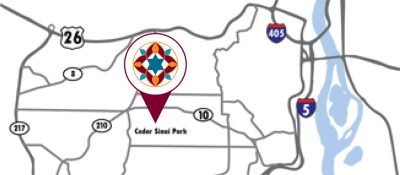Staff who have a question about caring for residents with dementia need to look no further than Heather Hess. The Interim Sinai In-Home Care Director is the only Positive Approach to Care (PAC) Certified Independent Trainers in the Portland-area, having recently completed the intensive certification process.
“The certification courses were really kind of awesome because I got a true understanding of the brain and why dementia is happening,” said Hess, 44, who joined Cedar Sinai Park nearly eight years ago as a caregiver in the Harold Schnitzer Center for Living. “You have pre-coursework before the certification classes, and then the coursework, and then lots of hands-on afterwards to put on a workshop for others about what you’ve learned. And I was working full-time on top of those responsibilities.
“To gain certification, I ended up training all of our caregivers for In-Home Care, so now all of our staff has advanced training in dementia care and they understand the expectations,” added Hess. “Our caregivers now have a level of education in dementia care that sets us apart from everyone else in the local senior living industry.
“The knowledge and skills our staff have are challenging to learn, but they said they now feel like they have a toolbox to work from and can handle clients with Alzheimer’s and behavioral issues much better. They get so excited and proud of themselves when the techniques they’ve learned work.”
PAC is an organization founded by nationally-recognized dementia expert Teepa Snow, who has developed a widely-respected person-centered and engagement-driven philosophy designed to support those living with brain change in a more positive and respectful way.
An estimated 6.2 million Americans age 65 and older were living with Alzheimer’s dementia in 2021 and that number was projected to rise to almost 13 million by 2050. One in three seniors dies with Alzheimer’s or another dementia—more than breast and prostate cancer combined.
“Learning how the brain works and advancing your knowledge as the disease advances is so critical,” says Hess. “There is so much we still don’t know. There are more than 250 types of dementia! We need to be prepared and ready to handle the influx of people who will need care.
“I’m so excited that we now have a consistent tool for us to use.”
Hess wanted to be a caregiver from a young age. “I was in and out of foster care as a kid so I did not have a stable family. Family and taking care of people was the only way I could connect and give back for a loss that I was feeling growing up.”
She started out at age 15 as a hospital candy striper in Ukiah, California, through an ROTC program, changing bed pans and re-positioning catheters among other patient duties.
“Those positions don’t even exist anymore,” said Hess, with a laugh. “It was a very emotional job and it really impacted me at 15. I learned that what we do from when people get sick to when they die is what matters in life.”
Hess earned a bachelor of arts in early childhood development while pregnant with her first child, who is high-functioning autistic, desiring extra skills to help her daughter.
“And then my husband and I moved to Oregon to take care of my elderly in-laws, so caregiving professionally was already kind of naturally lining up with what I was doing at home.
“I did my homework and Cedar Sinai Park was the only place I could find where I knew I could grow in my career. Also, Cedar Sinai Park had a reputation for having long-term employees, which is really what you’re looking for in a company. When a place has a lot of long-term employees, that says something solid about the company, and that’s what led to my decision to start here.”
Hess was client caregiver for Sinai In-Home Care for several years, training all the new hires. Even as Interim Director of Sinai In-Home Care, she is out in the field conducting client intakes, and develops and updates care plans, troubleshoots, and has quarterly client monitoring visits. She also attends job fairs, handles paperwork, coordinates staff in-services, and sits on several Cedar Sinai committees. Some of her clients are residents at Rose Schnitzer Manor where she is remembered as the “Flower Lady” for the various colorful flowers stuck in her up-do.
“I think we have a higher level of respect here than you get in any other outside senior agency,” said Hess. “It’s easy to talk to anybody here. If you have an issue, it’s dealt with; you’re not stuck waiting for a solution because of the comfortability level amongst staff and supervisors.
“Our residents and clients are truly are so important to me because they are an extension of our loved ones,” said Hess. “We might not be blood-related, but they live here long enough that they are family, and I love them like family. I really do.”
###


